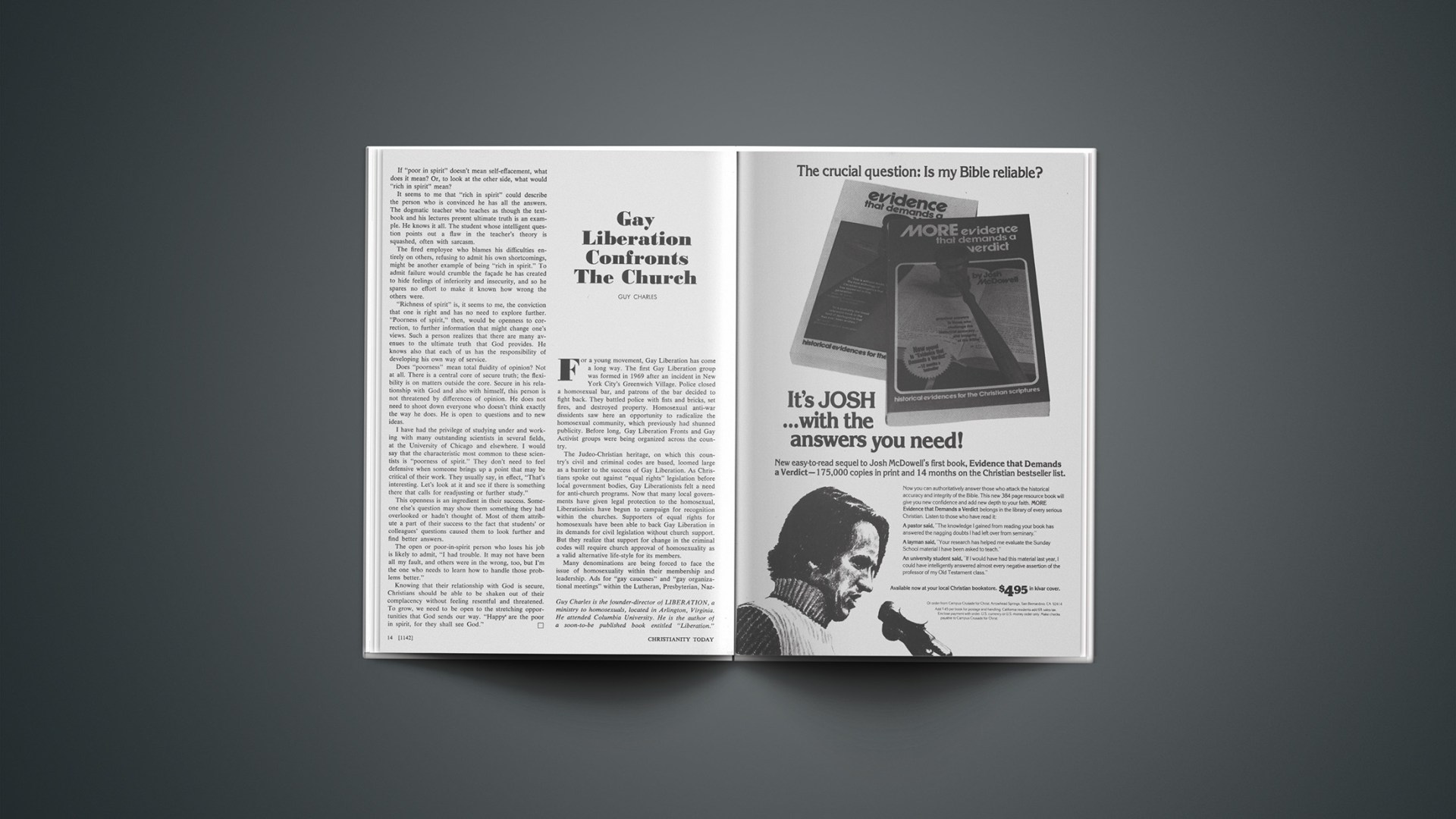Few parts of Scripture have been so violated in interpretation, from a psychological point of view, as Jesus’ statement “Happy are the poor in spirit, for they shall see God.” Many Christians take that verse as a signal to cultivate a psychological “poorness.” The “such a worm as I” theology has become as useful to the masochistic Christian as the flagellation of the body with whips done in the Middle Ages.
Poorness of spirit is often wrongly identified with a self-effacement that amounts to a total lack of self-confidence. The result is an inability to function adequately. Feelings of inadequacy then become the excuse for refusing to take an active part in God’s work, except to pray and give a pittance. Such a person is unlikely to progress far in his vocation; an employer is not inspired to have confidence in a person who has no confidence in himself.
Where does this grim pattern begin? Perhaps childhood problems were associated with a wrong interpretation of the “poor in spirit” verse. Add to that other biblical teachings taken out of context, such as “turn the other cheek,” “never be angry,” “put your brother before you,” and one has biblically backed reasons for doing nothing—for being acted on instead of acting.
Once the pattern gets established, passages that seem to contradict it are ignored. No “love thy neighbor as thyself,” no “be angry and sin not,” no “faith without works is dead.” The “poor” person brushes away the need to see how these teachings too apply to his Christian life.
If “poor in spirit” doesn’t mean self-effacement, what does it mean? Or, to look at the other side, what would “rich in spirit” mean?
It seems to me that “rich in spirit” could describe the person who is convinced he has all the answers. The dogmatic teacher who teaches as though the textbook and his lectures present ultimate truth is an example. He knows it all. The student whose intelligent question points out a flaw in the teacher’s theory is squashed, often with sarcasm.
The fired employee who blames his difficulties entirely on others, refusing to admit his own shortcomings, might be another example of being “rich in spirit.” To admit failure would crumble the façade he has created to hide feelings of inferiority and insecurity, and so he spares no effort to make it known how wrong the others were.
“Richness of spirit” is, it seems to me, the conviction that one is right and has no need to explore further. “Poorness of spirit,” then, would be openness to correction, to further information that might change one’s views. Such a person realizes that there are many avenues to the ultimate truth that God provides. He knows also that each of us has the responsibility of developing his own way of service.
Does “poorness” mean total fluidity of opinion? Not at all. There is a central core of secure truth; the flexibility is on matters outside the core. Secure in his relationship with God and also with himself, this person is not threatened by differences of opinion. He does not need to shoot down everyone who doesn’t think exactly the way he does. He is open to questions and to new ideas.
I have had the privilege of studying under and working with many outstanding scientists in several fields, at the University of Chicago and elsewhere. I would say that the characteristic most common to these scientists is “poorness of spirit.” They don’t need to feel defensive when someone brings up a point that may be critical of their work. They usually say, in effect, “That’s interesting. Let’s look at it and see if there is something there that calls for readjusting or further study.”
This openness is an ingredient in their success. Someone else’s question may show them something they had overlooked or hadn’t thought of. Most of them attribute a part of their success to the fact that students’ or colleagues’ questions caused them to look further and find better answers.
The open or poor-in-spirit person who loses his job is likely to admit, “I had trouble. It may not have been all my fault, and others were in the wrong, too, but I’m the one who needs to learn how to handle those problems better.”
Knowing that their relationship with God is secure, Christians should be able to be shaken out of their complacency without feeling resentful and threatened. To grow, we need to be open to the stretching opportunities that God sends our way. “Happy are the poor in spirit, for they shall see God.”










